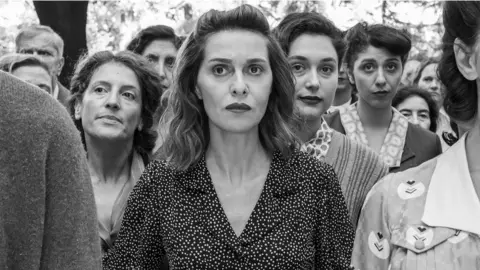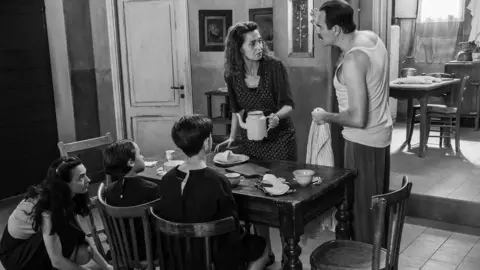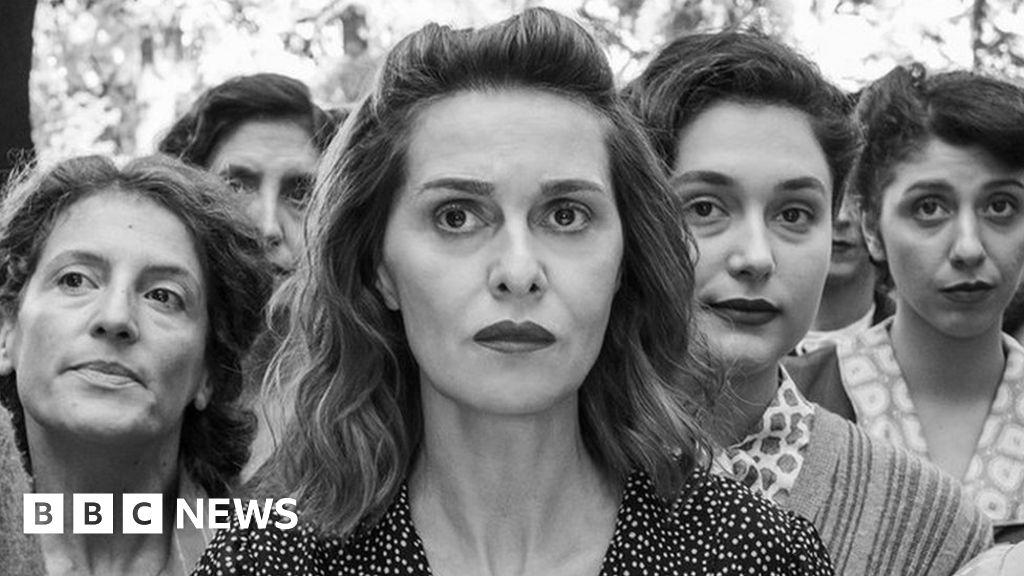 Fremantle
FremantleGreta Gerwig’s Barbie may be the most financially successful movie ever to be directed by a female filmmaker, and the highest-grossing film of 2023. But it was beaten at the box office in Italy by another film, also made by a woman and speaking directly about the female experience.
Cortellesi tells BBC News that she still can’t quite believe its success.
“No-one could ever have predicted the wave of participation and affection from audiences over this movie,” she says.
“I’ve been an actress for nearly 30 years, and I’ve written scripts for the last 10 years, now I’ve made my first film aged 50. And to share the screen and the box office with a huge film like Barbie, that also deals with the experiences of women, it’s got to be a good thing.”
Part of the reason There’s Still Tomorrow might have struck such a chord in Italy, however, is that the heroine, Delia, (also played by Cortellesi) suffers violent physical and emotional abuse by her husband. In the film, Delia is a housewife and mother living in poverty in post-war Rome in 1946, the year Italian women first got to vote.
 Fremantle
FremantleHowever, the film’s story resonates with contemporary Italian audiences. According to recent police statistics, 120 women were murdered in Italy in 2023, about one every three days. The report said just over 50% of them were killed by partners or ex-partners. A quarter of them were killed by their children – in 89% of those cases, their son.
Her funeral was attended by thousands of people and her death triggered major protests and calls for more protection for women.
Cortellesi says that her film partly attempts to explore a cultural mentality that she argues, “has been going on for millennia”.
So-called “crimes of passion” were only criminalised in Italy in 1981 and in July 2023, judges in Rome made worldwide headlines when a school caretaker was acquitted of groping a 17-year-old schoolgirl, because the sexual assault lasted less than ten seconds. A “brief groping” become a trend on Instagram and TikTok in Italy, along with the #10secondi hashtag.
“The subject of the killing of women is unfortunately very, very topical, especially in Italy,” Cortellesi explains.
“But femicide is often the tragic end of something that didn’t begin that way. What we don’t know is the history that culminates in a horrendous act of violence and a death of a woman every 72 hours in Italy. We can only infer a history of violence which is often not even brought to the authorities before it escalates.”
The director says that the themes of violence against women has been part of her scriptwriting for years, as well as in her stage and screen work as an actor, although she says she hasn’t personally experienced it herself.
“I wanted to make a contemporary film set in the past in order to compare what’s changed and what’s stayed the same,” she explains.
“We might now, as women, have certain rights and safeguards, but what hasn’t changed in society is this mentality that distorts love and turns it into possession. That’s why we need better education.”
There’s Still Tomorrow may be set in 1946, shot in black and white (a nod to classic Italian filmmakers of the period) and tackle a subject like domestic violence, but an ironic humour still pervades the story, something the filmmaker says she believes helped audiences relate to it.
“When I’ve written scripts in the past, I’ve used this same kind of language,” she says. “It’s not comedy per se, it’s using the language of comedy to talk about some very serious themes. I feel that by using humour you can usher in these topics. You know that people are going to hopefully empathise and take the side of your heroine, without me being confrontational in my cinematic language.”
When There’s Still Tomorrow first premiered in Italy, English-language industry publication Screen Daily called it “a sentimental tale of suffering and self-sacrifice”, adding that Cortellesi “executes it with style”.
“The domestic violence… is at times, choreographed into a grotesque and startling dance,” said Screen Daily critic Allan Hunter, adding: “The more overblown romantic moments are undercut by… dry humour”.
 Getty Images
Getty ImagesOld-fashioned word of mouth is credited for the film’s longevity and financial success, as well as the filmmakers taking the film on to regional towns and cities and holding extensive Q and A sessions alongside the film.
Cortellesi claims that 45% of her audience demographic in Italy were men, which she calls “a great joy”.
“This was never meant to be a film against Italian men, it’s an invitation to share and walk together down the same path in life. I really didn’t want to alienate men from watching the film and think I was pointing an accusing finger at them.
“I think because of the tone of the movie and the way all the different characters were portrayed, men actually identified with the female characters, I could see it in the way they reacted during the film.
“A lot of men felt able to speak up in the Q and A sessions afterwards, and share their own stories, which I often found really moving.”
Ultimately though, the actress and director calls her 11-year-old daughter her “muse” for the film, and says it could be described as “a mother-daughter love story”.
“This whole project happened because I was reading her a book about women’s rights, and my daughter couldn’t believe that a time existed when our rights weren’t in enshrined in law. So it occurred to me we needed to talk to younger generations that they have to realise their rights aren’t a given,” she says.
“Just because we achieve something, it doesn’t mean it’s going to be there forever. I wanted, in a way, to start passing the baton to a younger generation.”
There’s Still Tomorrow is released by Vue Cinemas in the UK and Ireland on 26 April 2024.


